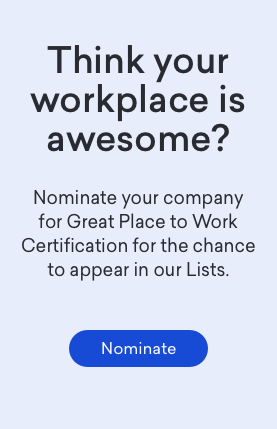Growing companies can learn from the nation’s Best Small Workplaces.
Periods of growth are vital (and often daunting) phases for small organizations. How do you engage your workforce to not only stick with the company during a period of change, but also to also aid in the growth process – becoming key advocates for your brand?
Best Small Workplace Insomniac Games, a Burbank-based video game developer with just over 200 employees, shows us the value of “sharing everything” with employees. The company increased its headcount by 150% over a two-year period with explosive success, which leaders credit in part to the company’s deep commitment to transparency.
As the organization built their high-trust culture, Chief People Officer Carrie Dieterle reports that Insomniac Games has held nothing back from employees unless “contractually obligated to do so.” By opening the lines of communication, employees feel energized by and included in the company strategy, and understand how they drive it forward.
As a result, they are the company’s strongest advocates. Said Dieterle, “When I think about the benefit of transparency and not holding anything back, I think that you have just engaged an entire workforce in driving your business forward.”
Small businesses can learn from some of the actions that Insomniac Games and other Best Small Workplaces have taken to build trust-based cultures that help employees become brand advocates:
- Institute programs that foster transparency, such as Insomniac Games’ “Ask Me Anything” online portal, where culture-related questions are personally answered by the company’s Founder/CEO.
Transparency at any organization results in trust, and trust, as we know, is a vital component of great workplaces. Honesty and transparency in personal relationships is hugely important—a friend or partner hiding or refusing to disclose relevant information leads to mistrust, and the same concept can be applied to organizations. However, when employees feel that upper management is willing to share information, a culture of trust and fairness is fostered. For example, at #1 Best Small Workplace Radio Flyer, employees say they’re like a family. “I come [to work] each day excited to see what’s in store and how we can improve ourselves,” said one Radio Flyer employee. - Provide opportunities for employees to speak candidly (and privately) with leadership, such as Insomniac Games’ one-on-one “IF” (Insomniac Future) meetings, where employees provide feedback/opinions to the Chief People Officer.
One-on-one meetings where an employee can share ideas or opinions with leadership furthers transparency within an organization (keeping open channels of communication) but also helps to ensure every employee feels like an important part of the team. Such programs help to develop employees that not only trust their leaders, but also feel invested in the company’s future. At the 2015 50 Best Small and Medium Companies, 86% of employees on average reported that “management involves people in decisions that affect their jobs or work environment.” - Create multiple channels for information sharing such as Insomniac Games’ “Daily Decision” emails or “CEO Walk Arounds”.
Is everyone rowing in the same direction? As even the best workplaces increase in size, it can be easy for important information to get lost along the way, resulting in a serious detriment to the goals of trust and transparency. Having multiple channels for information-sharing helps to cement transparency within an organization, ensuring that all employees are privy to the same information. Best Small Workplace Limeade, which scored 100% on the survey statement: “Taking everything into account, I would say this a great place to work,” has a “Director of Culture and Wellbeing” who helps to ensure that employees have a consistently positive work experience.
What’s the ultimate ROI for a culture of trust and transparency?
For Insomniac Games, a culture of trust allowed for easy delegation of responsibility and significantly increased their game production each year, lowered turnover rates, and created brand advocates out of employees. The company reports that their efforts to build trust and transparency have also led to a 79% increase in knowledge sharing, a 32% drop in benefit costs to the company, and 53% increase in employee referrals. “People believe in Insomniac Games,” says Dieterle. “Employees know they have a voice, they know they have a say.”
To learn more on fostering transparency and engaging employees during times of growth, read the full Insomniac Games case study here.














